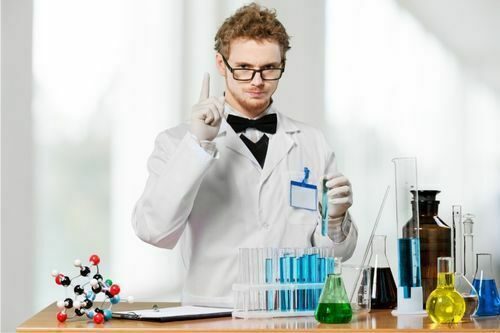Table of Contents
They research the nature of matter both at the extremely high pressures present in the earth’s core and the extremely low pressures seen in interstellar space. Biophysical chemists work with very big molecules that are the foundation of life, while nuclear chemists research the composition and changes that take place in the atom’s nucleus.
The study of genetic material, chromosomes, and DNA replication; the research of polysaccharides that adorn cells’ surfaces; the clarification of the role of comparatively tiny molecules in cell signaling; the manufacturing, conversion, and energy storage research on the photosynthetic process; the development of fertilizers that aid in the production of abundant harvests; and a wide range of other topics are all included in today’s chemistry research. Let’s understand a little bit more about this field.
BSc Chemistry Syllabus

The BSc Chemistry course syllabus encompasses a diverse range of topics that students will learn about. Students in this BSc degree take four core subjects each semester in addition to other classes that help them develop a thorough understanding of the various fields of chemistry. Additionally, at the end of each semester practical assessments will test student’s knowledge and comprehension of various subjects.
The study of different areas of chemistry, such as inorganic, organic, physical, and analytical chemistry, as well as options such as analytical methodologies in chemistry, polymer chemistry, and industrial chemicals and the environment, are the main topics covered in BSc Chemistry.
At the undergraduate level, every field of study includes both core and optional courses. The fundamental subjects covered in the curriculum must be mentioned when discussing the BSc Chemistry syllabus.
The three main subfields of chemistry, organic, inorganic, and physical, make up the majority of the degree program.
- Organic Chemistry is the study of a wide variety of carbon-containing molecules, most of which are known as organic compounds. It examines their characteristics, reactions, structures, and methods of formation.
- Inorganic Chemistry: With an emphasis on inorganic materials, this subject explores these compounds’ structures, characteristics, and reactions to other chemical elements and compounds—aside from organic molecules.
- Physical Chemistry circles around how chemical reactions take place while also studying the atomic and molecular level processes and characteristics of materials. Additionally, it examines a variety of physics ideas as well as macroscopic and particulate processes in chemical systems.
- The separation, identification, and measurement of chemical substances are all topics covered in the course of analytical chemistry.
Career options after BSc Chemistry
The subject of chemistry is very fascinating since it touches practically every area of human life. It is an essential component of every aspect of daily life, from the air we inhale to the land on which fruits and vegetables are grown. Even our thoughts about our emotions and how our clothes make us feel are in some way connected to the vast field of chemistry.
The spectrum of courses available after a BSc in Chemistry includes master’s, postgraduate diploma, and Ph.D. level degrees. Here is a chance for recent chemical science graduates with a solid grasp of the many chemical types, compositions, and properties. The three primary sectors where chemical graduates are employed are research labs, businesses (mostly chemical and biopharmaceutical), and colleges and universities.
Students who recognize the basic ideas and applications of chemistry might enroll in a specialized course of study to gain a thorough understanding of this broad discipline. These courses range in length from two to three years. Some eminent postgraduate Chemistry courses are listed below.
- MSc Molecular Chemistry
- Master in Computational Chemistry
- MSc Environment & Green Chemistry
- MSc Biochemistry
- MSc Oil & Gas Chemistry
- MSc Physical & Materials Chemistry
- MSc Theoretical Chemistry
After earning their degree in BSc Chemistry, many graduates want to look into employment opportunities in the government. Following a BSc in Chemistry, these are some government job options available to you.
- Lab Technician – Govt-funded academic institutions
- Medical Assistant/Data Entry Operator- Hospitals
- Junior Research Fellow- Research institutes in India, CSIR, etc.
- Demonstrator – Medical Schools and Universities
- Professor – Universities & Colleges
The most popular professions in BSc in Chemistry

- Safety Health and Environment Specialist
- Professor or Tutor
- Lab Assistant
- Scientific Data Entry Specialist
- Research & Development Manager
- Product Officer
- Production Chemist
- Water Quality Chemist
- Food and Flavor Chemist
- Agricultural Chemist
- Pharma Assistant
- Material Science
- Cytologist
- Radiologist
- Toxicologist
- Quality Controller
- Biomedical Chemist
- Chemical Engineering Associate
- Subject Expert
- Lab Chemist
- Clinical Research Specialist
- Medical Technologist
- Industrial Research Scientist
Key takeaways
- The spectrum of courses available after a BSc in Chemistry includes master’s, postgraduate diploma, and Ph.D. level degrees. Both working and applying for jobs are options for candidates.
- Graduates with a BSc in Chemistry can find work in the pharmaceutical and chemical industries, as well as in the plastic and agrochemical industries, forensic science, and other fields.
- Our primary needs of food, clothes, shelter, wellness, energy, and pure air, freshwater, and soil are all met by chemistry. Chemical technologies improve our condition of life in many ways by offering fresh approaches to issues with health, resources, and energy use. The demand for professionals in chemistry as a subject of study and employment is growing alongside advancements in technology.
Liked this blog? Read next: BSc in Nursing entrance exam- eligibility, exams, tips, and more
FAQs
- Which universities are the best for a BSc Chemistry degree?
Answer- Some of the best universities in the world that offer BSc Chemistry degrees are:
Harvard University
Massachusetts Institute of Technology (MIT)
Cambridge University
Berkeley University
Berkeley, California-based University
Oxford University
- What is the duration of BSc Chemistry?
Answer- A BSc in chemistry typically takes three to four years to complete and is segregated into numerous semesters.
- What can we do after BSc Chemistry?
Answer-After earning your BSc in Chemistry, you have the option of pursuing a Master’s or Postgraduate Diploma in the field or working.






